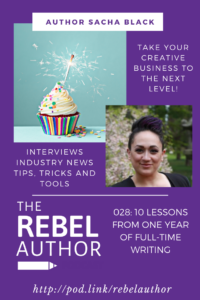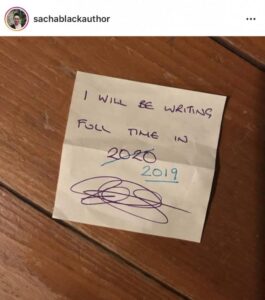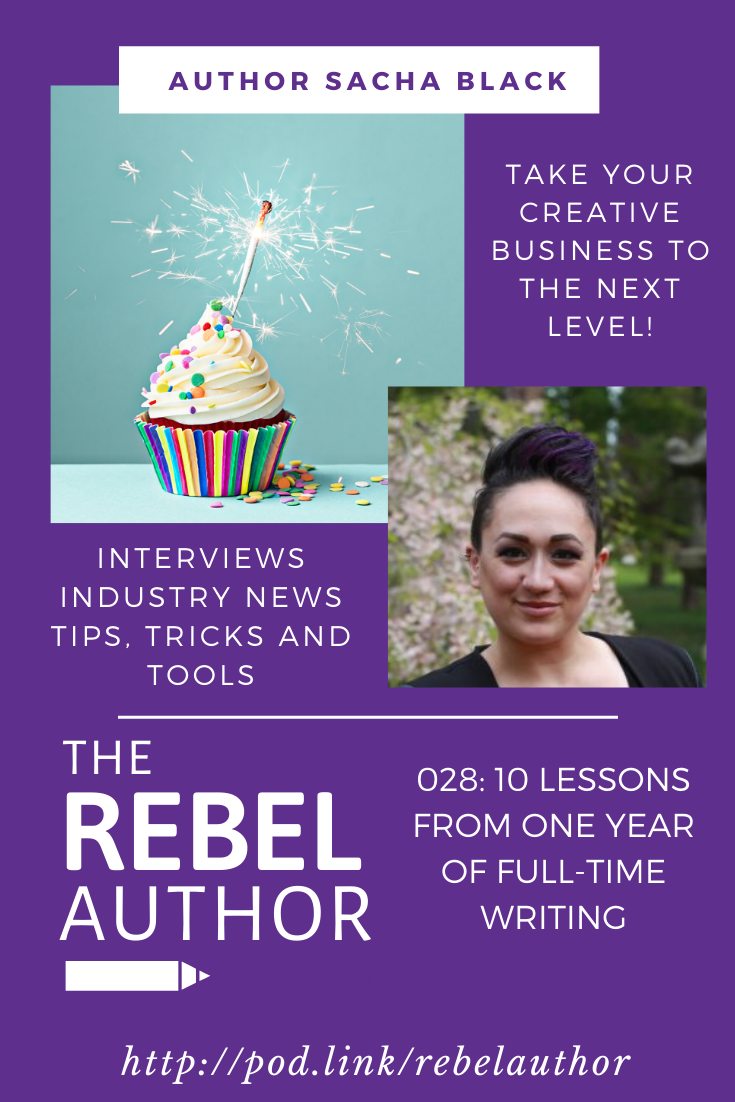 I spent a long time thinking I’d never be able to leave my job, so it’s a bizarre feeling to sit here and write a post about my one year anniversary of having done just that. Here are 10 lessons from one year of writing full-time.
I spent a long time thinking I’d never be able to leave my job, so it’s a bizarre feeling to sit here and write a post about my one year anniversary of having done just that. Here are 10 lessons from one year of writing full-time.
For a long time I carried a Post-it in my wallet. An affirmation of sorts, one I looked at multiple times a day. Every time I bought a coffee or paid for something I’d see the note and run the words through my head like a mantra. It helped keep me going when times were dark and the desperation to leave the day job was strong.
Originally, I thought I’d leave work this year: 2020. Instead, I left last year and 2020 actually sees me celebrating my one year anniversary of working for myself.
Here are some of the reflections I’ve made as I look back at the last year.
10 Lessons from One Year of Writing Full-Time: the income
In my first year, I didn’t care what I earned. My sole goal was to survive. Which meant, not having to go back to a day job, not getting into debt and being able to pay all my bills. Well I survived, I didn’t have to go back to my day job and I didn’t get into debt, unless you count the several hundred thousand pounds I spent on buying a house this week.
On reflection, I think not having some kind of monetary aim was a mistake. It meant I didn’t focus on it and therefore didn’t try to earn anything more than whatever came to me. I coasted because I didn’t know better.
One revenue stream in particular is responsible for 49% of my income. I’d like to change that to ensure that there’s a more of a balance across all my streams.
 In my first year, my income streams include: book sales, ALLi work, freelance work, patreon, merchandise, affiliate income, and editing.
In my first year, my income streams include: book sales, ALLi work, freelance work, patreon, merchandise, affiliate income, and editing.
In the next year, I want to add audiobooks and courses to my income streams as well as speaking and an investment portfolio. Oh, and a hard financial goal. I’d love to surpass my old job income, but whether I manage that in the coming year or the next one remains to be seen.
Takeaway 1: set income goals, pay attention to your finances and push for what you want to achieve.
10 Lessons from One Year of Writing Full-Time: business basics
For a while, you can coast along doing the fun stuff. You can make shit up, play god and destroy your protagonist’s life. But eventually, you’re going to have to buckle down and build a structure for yourself in your business.
It’s the bit most of us don’t enjoy.
- You need a mailing list.
- You need an autoresponder. And you need to review and update it every time you create something new.
- You need a reader magnet.
- You need accounting software.
- You need a file naming structure.
- You need a website. Maybe even to sell direct.
- You need a list of all your assets and all their key information.
- You need a system and process for writing books. It’s no good drifting aimlessly, if you want a career out of this, you need a process to ensure you finish books.
I could go on.
But the point is, there’s only so long you can coast doing the good stuff and ignoring the business bits. In reflecting on my first year, I’ve realised I’m not baaaaad at the business basics, but there’s definitely stuff I’ve neglected. I’m going to end this lesson with an analogy.
You can’t build a house without foundations. If you do, that shits gonna fall down hard at some point.
The same goes for your business.
You can’t build a business without the basics.
Takeaway 2: don’t forget the business basics. Write a task list and even if you attack them 1 a month over the course of a year, make sure you do so your business is built on solid foundations.
10 Lessons from One Year of Writing Full-Time: details matter
If you’re not a detailed person—and I’m really not—then this is one of the harder lessons to learn. Harder because if you don’t keep track of the details, it’s gon’ cost you money! A crap ton of money.
Here’s an example. This very morning. My first hardback book arrived. I’ve been hankering after hardbacks for a while. I know as a good publisher, it’s something I should have done ages ago. But money, time, and priorities got in the way.
It arrived this morning, and it’s beautiful. I mean truly. But there was something wrong. There was no text printed on the spine. Of course, I’d chosen the hardback because I wanted text printed on the spine. But idiot me didn’t check the details. I assumed they’d take the text on the spine and print it. Alas not. So now I’ve ordered a proof hardback with rush delivery and it’s wrong. Of course, that is the point of proof copies. But also—ugh. While this one error has only cost me £20, when you add them all up over time the mistakes cost.
Here’s another example, my mailing list costs me £60 plus a month. If I’d taken the time to look at the details of price comparisons, I’d have realised sooner that I could swap providers and potentially save myself over £40 a month while retaining all the same functions.
I don’t want to make excuses, but when you’re tired and exhausted, you tend to favor your strengths and not your weaknesses. Working on your weaknesses is hard, it’s tiring. But as a good business person, as a good publisher, you gotta do the hard work.
Details matter guys.
Maybe your weakness isn’t details, it’s something else. Maybe you’re not a strategic thinker, maybe you’re not a goals person. Whatever your weakness, put some time and effort into strengthening it.
Takeaway 3: don’t forget the details. Don’t be like me and in a rush to complete everything. Checked it over twice? Good. Check it a third time and then get someone else to check it for you too.
10 Lessons from One Year of Writing Full-Time: focus on you and your projects
This is probably the hardest lesson I learned this year and the one I find most difficult to stick to. This is one I really want to focus on going into my second year.
When I left my job, I took on stacks of freelance work. I was terrified I wouldn’t pay my bills. Terrified I would have to go back to a job I hated. I wasn’t thinking about me. I was just hell bent on surviving. Make it to the end of the first year and then *some magical mythical unicorn-shaped thing that will appear and suddenly make me realise all is well*
There was no unicorn, people. There were just 365 very long days and a slow gradual realisation.
The realisation was twofold:
- I didn’t need much money to survive.
- If I didn’t need much money then I could take less freelance work from others and still pay all my bills and BONUS get my time back.
See, I realised my time was more important than my money. I needed my time to create the things I wanted to create. Sure, in the meantime it meant earning a little less. But in the long run, I’d earn far more because I’d have created things I can sell, things that will out last my life and provide income for my children and grandchildren.
I knew this lesson. We all know this lesson. But there’s something very different about knowing something and then living it in practice. I suppose it’s a little like being a parent. Everyone gives you advice and tells you how it will be. You smile and nod and acknowledge their experience. But it doesn’t matter how much they say or you hear, parenting is an inexplicable journey that no second hand lesson can prepare you for.
Takeaway 4: expect to learn lessons you’ve already learned all over again. Expect to learn lessons you didn’t think you would. Know that your time is far more valuable than the money you can exchange for it.
10 Lessons from One Year of Writing Full-Time: keep learning, learn inside, learn outside
I spent a long time learning and studying the industry on my way to leaving my job. I consumed information, blogs, podcasts, courses. It would be easy to just stop once you reach that big goal of leaving your job. But it would also be irresponsible.
The only way to grow is to keep learning, keep changing. That means consciously, intentionally putting time and effort into studying the industry and your craft and trying to grow your knowledge.
I’ve been to fewer conferences this year, not because I wanted to go to less, but because: corona-gate. The ones I have been to have found me coming away with fewer and fewer lessons learned. I asked someone I respect why this was and they made the point that most conferences are pitched at beginners or middlers… that’s a word, I swear. Once you’ve been to enough conferences, you’ve soaked up the information. Then it’s about the networking. If you want to continue learning, you have to grow your circle of learning, reach into connecting sectors, look at business and entrepreneurs, look at your interests and the industries surrounding them.
My point to you is, yes, the indie world is essential, but you can learn just as much about business and making money in our sector as you can from other industries.
Takeaway 5: Keep intentionally learning. Yes, learn from inside the indie sphere, yes improve your craft, but also keep an eye on other sectors, on other models. You can learn as much from them as you can fellow authors.
***
MUSICAL INTERLUDE:
I really believe that 80% of surviving your first year, and actually, surviving long term is mental strength and mental resilience. I didn’t know this until I wrote this reflection and saw that my lessons were split 50/50 business and mindset. Here beginith the mindset lessons.
10 Lessons from One Year of Writing Full-Time: the leaps of faith don’t stop with ‘I quit’
For a while, I thought the only leap of faith I’d have to make was leaving my day job. Oh Sacha. Dear sweet, naïve Sacha… In the words of Ygritte, “You know nothing, Jon Snow.” If one thing is totally clear, it’s that working for yourself is a continual ‘schooling’.
See that fateful ‘I quit’ leap was huge. In some ways it’s probably the biggest leap of faith any of us ever have to take. But there are definitely other leaps of faith that crop up along the way.
From trusting your gut, deciding whether to enter into a collaboration, deciding which product to create first, or whether to end a freelance relationship, the mini leaps of faith don’t stop. In fact, they get more frequent. Though perhaps, as your confidence and resilience grows, each leap gets a little easier.
Takeaway 5: as brave as you had to be to say ‘I quit’, be prepared to use similar levels of bravery during your first year in business.
10 Lessons from One Year of Writing Full-Time: you’re on your own, until you’re not
One of the hardest and most fulfilling parts of working for myself is the fact that yes, while mistakes are my fault, so are all the successes. I love that. Every pound I bring in is earned through my hard fought work. It makes me proud. I know that’s not for everyone. I know for some the safety of a monthly paycheck is too important. And I get it, believe me. I’m a shit load greyer at the end of this year than I was a year ago! That would be the stress. It’s stressful being completely responsible for your income. But I kinda love it in a sick, masochistic sort of way.
But all that said and done, what this life is, is pressured and isolating. I thought I’d get lonely working by myself, but actually, I haven’t at all, there’s not been time to get lonely. But then, I’ve intentionally cultivated friendships. And I’ve realised just how vital those friendships are. Spouses, loved ones, no matter how supportive they are, don’t really get it. I adore my wife and I’ll forever be grateful for her support in me leaving my job. But there’s something that she (and anyone’s loved one) just don’t get.
You need the solidarity of a friend who’s been there, done it and worn five of the t-shirts. I’m not sure yet, whether it’s the mental highs and lows we go on, the strange slant a creative mind has or something about the weight of sole responsibility for a business. But there’s definitely a connection I need with fellow writers to just chat industry, business and writing nonsense that they understand.
Whether you’re an extrovert who finds it easy to make friends, or not, friends, especially industry friends are vital in your first year of business. To mine, both peers and mentors, you know who you are, thank you.
Takeaway 6: cultivate friendships, especially fellow writers or business owners. They’re more important than you know.
10 Lessons from One Year of Writing Full-Time: Resilience
Before I left my job, I was buzzing off the excitement of “I’M GONNA HAVE ALL THE HOURS IN THE DAY TO WRITE.”
Oh, Sacha. Oh, dear sweet fucking innocent Sacha. How wrong you could be.
Whatever you think you’re going to get time-wise, halve it and assume that half will be pressured. I’m serious.
Transitioning took far longer than I thought it would. Even now, I don’t really feel settled because things keep changing. I’m about to move house, again. Though this time for the last time. My business model changed from heavily freelance to now much less so, that took an adjustment.
In my first eight months of solo life, I lost one full working week every month. THAT’S TWO MONTHS OF NOT WORKING in my first eight months. Believe me, that was not through choice. Time is a fickle bitch and if you’re not super strict with your working time, it will abandon you. From family holidays to sick kids, dentist and doctors appointments, food deliveries and more. It’s very easy to suddenly have time vanish. Lesson learned. I have to be much stricter with my time. But also more resilient with both my planning and my mental strength.
Ensuring I put slippage time on deadlines and launches and project completions has helped. When I was deciding my launch date for The Anatomy of Prose, I wanted it to be the end of March. Then I moved it to early April. Never have I been more grateful for one of my friends pressuring me into a longer preorder. If you’re listening Meg LaTorre, I owe you one. No sooner did I hit the preorder go live—having given myself an extra two months of just in case—then corona virus shut the country down. Meaning I had a 6 year old around my feet 24 hours a day. Good fucking luck getting launch work done now Sacha.
I could have let that crush me. I could have thrown a tantrum and despaired knowing that I couldn’t do as much for my launch as I wanted. But there’s no point. Mental resilience is key. Just because it will be a lower key launch, doesn’t mean I stop there. Once it’s out I can keep marketing. Once the kids are back at school I can work harder.
No matter what you think is going to happen, it won’t. Life will constantly throw blockers and obstacles in your way. You’re not going to have endless streams of time for your business. I’m drowning in house and mortgage paperwork, then we’ll be packing and moving and dealing with school changes. There’s always going to be something trying to get in the way.
Resilience.
Expect things to get in your way, prepare yourself mentally, and give yourself as much time as possible. Just because you haven’t got as much time as you planned, doesn’t mean you’ve failed or you’re business isn’t going to work. It will, you just have to be flexible and find a new route.
Takeaway 7: Expect things to get in your way, prepare yourself mentally, and give yourself as much time as possible.
10 Lessons from One Year of Writing Full-Time: you can’t work 24 hours a day
Transition is brutal. You go from a day structure that effectively 90% of society follows to no rules, no boss, no expectations. You’re on your own, which means you get to make your own schedule too. And then suddenly you get to do the thing you love more than anything ALL.DAY.LONG. The temptation to just continue working all day and all evening is real!
Worse, there are no boundaries. Work is home is work is home. My office is in my house so the lines of separation are blurred to say the least. Even though I’d happily work 24 hours a day, my body conks out and my family eventually strop—and rightly so.
The lesson here is that eventually, despite my best intentions to work until my eyes bleed, and pieces of my body fall off, I simply can’t. This is a work in progress. Getting the right balance is something I’ll probably always struggle with. I’m an out and proud workaholic, I love what I do, and I have big goals to achieve.
Takeaway 8: balance is hard to achieve, get comfortable experimenting and if your family tell you you’re working too hard, don’t get mad, just listen. They’re probably right.
10 Lessons from One Year of Writing Full-Time: say yes until you have to say no
When I first left work, I was terrified—almost to the point of paralysis. What if I couldn’t pay my bills? What if I couldn’t put food on the table? So I took on freelance work (and a lot of it). Unfortunately, that led me to the point of burn out because I was still trying to do all the things for my business too. I ended up extremely tired and in a position where most of the time I’d worked was spent on things for others instead of writing and creating products I could sell.
This was a gift and a curse. It enabled me to grow in confidence. Over time, I realized I could survive just fine without all that freelance work. No one was going to go hungry. But if I’m going to make this work, then I needed to refocus my time on creating things that will last.
Learning to say no to quick cash is a tough one. There’s a mindset shift required; you have to value yourself, your work and your ability to make things that generate income. That takes time.
Takeaway 9: when you first leave your job, having a mix of freelance and passive income is good for reassurance and buying you time to grow your confidence, but eventually, you’re going to have to say no. And that’s okay too.
10 Lessons from One Year of Writing Full-Time: no matter what happens, this is better
 In a way a lot of this year-long journey has been about survival, just getting to the end to defeat the fear. I guess it’s been a journey of empowerment.
In a way a lot of this year-long journey has been about survival, just getting to the end to defeat the fear. I guess it’s been a journey of empowerment.
I was in the unfortunate position of not enjoying my day job. I spent a long time struggling to stay positive because of that. And it’s probably why a lot of the first year was spent shrouded in fear; fear of being broke, fear of having to go back, fear that I’d fail.
I’ve reached a point where I know that no matter what happens, no matter what I have to do to earn money, for me personally, this life is 100% better than anything that came before. Leaving work really solidified what’s important in my mind. When I look back at who I was and how crippled I was, mentally, physically and emotionally, I know nothing can be that bad again. I won’t allow it. I keep this photo—which was taken on one of my darker days in the office—as a reminder. As a short sharp slap to ensure I practice appreciation and gratitude, even on the hard writing days.
Takeaway 10: no one said this was easy. But it is fun. It is play. This is the best job in the world, and it’s worth every millisecond of rollercoaster. It’s worth every bit of blood, sweat and tears it takes to get here. So keep driving forward, keep learning, keep pushing and at some point, take the leap of faith and say, “I QUIT.”

You know, I’m so proud of you.
You took the leap, you had the faith (though you wobbled, initially) and look where you are, now!
May you get to the state where you’re earning enough to get yourself a virtual PA to deal with all the niggly business stuff so you can continue to create and build your Rebel Author World – because it’s awesome 💜💜💜
awww thank you my lovely, I appreciate all the support you’ve given me <3
💜💜💜
Great post. I love the list in the first lesson. I’ve got four of them and at this time of year I totally agree with the need for accounting software. I can’t imagine what it would be like if I was full time!
It’s a nightmare, thank god for accounting software! Four is an amazing amount of streams. 🙂 May you have many more to come.
Sasha. This is, hands down, the most helpful article I have ever read. This describes taking the “plunge” perfectly! These lessons should be required reading for every creative who dreams of leaving their day job. Brilliant.
Thank you so much Amy, I really really appreciate it <3
Loved reading this. You should be so proud. Xx
hehe thank you my lovely 😀